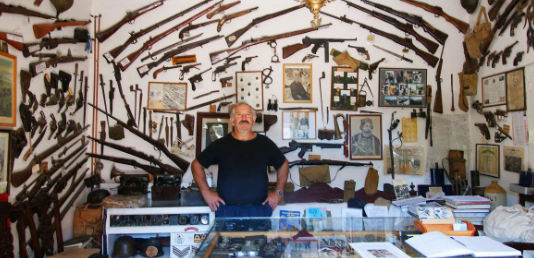Crete, the largest of the Greek islands, has a storied history of resistance against foreign occupation and oppression. The legacy of Cretan resistance is a powerful testament to the island’s enduring spirit, bravery, and resilience. From ancient times through the Ottoman period and the brutal years of World War II, the people of Crete have consistently demonstrated their unyielding determination to fight for their freedom and preserve their cultural identity. This legacy of resistance is deeply woven into the fabric of Cretan society, inspiring future generations and shaping the island’s identity.
Ancient Beginnings
The spirit of resistance in Crete can be traced back to ancient times, particularly during the Minoan civilization, which thrived from approximately 3000 to 1450 BCE. Although much of the early history is shrouded in myth and legend, the archaeological record suggests that the Minoans were a formidable society that defended their territory against external threats.
- Minoan Civilization: The Minoans developed advanced defensive structures and sophisticated weaponry, indicating their preparedness to resist invasions. The decline of the Minoan civilization is often attributed to natural disasters and external invasions, yet their legacy of resilience set the stage for future generations.
Venetian and Ottoman Rule
The Venetian and Ottoman occupations of Crete were marked by continuous uprisings and acts of defiance by the Cretan people. The island’s strategic location made it a valuable prize, but also a hotbed of resistance.
Venetian Period (1204-1669)
During the Venetian period, Cretans were subjected to heavy taxes and harsh rule, which sparked numerous revolts.
- Revolt of St. Titus (1363-1364): One of the most significant uprisings during this period was the Revolt of St. Titus, where Cretan nobles and commoners joined forces against Venetian oppression. Although ultimately suppressed, the revolt demonstrated the unity and determination of the Cretan people.
- Cultural Resistance: Despite Venetian attempts to impose their culture, Cretans preserved their language, religion, and traditions, subtly resisting cultural assimilation.
Ottoman Period (1669-1898)
The Ottoman conquest of Crete was followed by a series of brutal reprisals, but the Cretan spirit of resistance never wavered.
- The Great Cretan Revolt (1866-1869): One of the most famous uprisings was the Great Cretan Revolt, culminating in the heroic defense of the Arkadi Monastery. The monastery became a symbol of sacrifice and resistance after its defenders chose to blow it up rather than surrender to the Ottomans.
- Continuous Uprisings: Throughout the Ottoman period, Cretans engaged in guerrilla warfare and periodic uprisings. These acts of defiance kept the spirit of resistance alive and paved the way for Crete’s eventual union with Greece in 1913.
World War II and the Battle of Crete
World War II marked one of the most significant periods of resistance in Cretan history. The Battle of Crete and the subsequent occupation by German forces showcased the island’s resilience on an international stage.
The Battle of Crete (1941)
The Battle of Crete was a pivotal event during World War II, where German paratroopers launched an airborne invasion of the island.
- Cretan and Allied Resistance: The Cretan population, alongside Allied forces, mounted a fierce defense against the invaders. Civilians armed with farming tools and makeshift weapons joined the battle, demonstrating extraordinary bravery.
- Strategic Importance: Despite the eventual German victory, the battle delayed the Nazi campaign in the Soviet Union, highlighting the strategic significance of Crete’s resistance.
German Occupation
The German occupation of Crete was marked by severe reprisals and atrocities, but the resistance movement continued unabated.
- Partisan Warfare: Cretan partisans, supported by the British Special Operations Executive (SOE), conducted sabotage operations, ambushes, and intelligence gathering. Notable resistance leaders included Patrick Leigh Fermor and Manolis Paterakis.
- Operation Mercury: The kidnapping of German General Heinrich Kreipe by SOE agents and Cretan partisans in 1944 was a bold operation that boosted Allied morale and underscored the effectiveness of the resistance.
Post-War Legacy
The legacy of Cretan resistance is commemorated and celebrated in various ways across the island. Memorials, museums, and annual events ensure that the bravery and sacrifices of the past are not forgotten.
Memorials and Museums
- Arkadi Monastery: The Arkadi Monastery stands as a national symbol of sacrifice and resistance. It attracts thousands of visitors each year who come to honor the memory of those who perished in the 1866 revolt.
- War Museums: Museums such as the Historical Museum of Crete in Heraklion and the Battle of Crete Museum in Chania preserve artifacts and recount the stories of resistance fighters, providing educational resources for both locals and visitors.
Cultural Celebrations
- National Holidays: Greek national holidays, such as Independence Day and Ohi Day, are marked by parades and ceremonies that honor the resistance efforts. In Crete, these events have a particular resonance, given the island’s history.
- Local Festivals: Numerous local festivals and commemorations are held to celebrate Cretan resistance heroes and significant historical events, fostering a sense of pride and continuity within the community.
Conclusion
The legacy of Cretan resistance is a powerful narrative of courage, resilience, and unyielding determination. From ancient times through the Venetian and Ottoman periods to the heroic struggles of World War II, the people of Crete have consistently demonstrated their willingness to fight for their freedom and preserve their cultural identity. This legacy not only honors the past but also inspires future generations, reminding them of the strength and resilience that define the Cretan spirit. As Crete continues to evolve, the stories of its resistance remain a vital part of its identity, ensuring that the island’s heritage of bravery and defiance is never forgotten.


